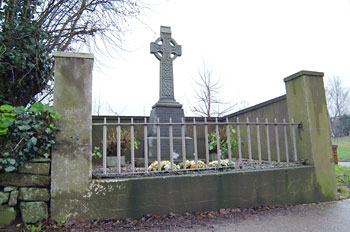|
Murder of Delaney Brothers at Dublin Hill (Irish War of Independence - First Cork Brigade) |
|
|
|||||||||
|
On the
night of the burning of About Their
brother-in-law, William Dunlea, who was over sixty years of age, was sleeping
in another bed. He was fired on by the same party and wounded in two places. According
to Daniel Delaney, the father of the brothers, the assailants wore long overcoats,
and spoke with strong English accents. At a military
enquiry (a civilian enquiry had been refused by the authorities) one of Daniel
Delaney's daughters gave this account of what happened; (Having
been awakened by the loud knocking on the door) I arose and went towards my
brothers' bedroom. I saw a number of men going downstairs, their backs towards
me. I entered my brothers' room, and saw my brother Jeremiah lying on the
floor; he was not then dead, his lips were moving. My brother Con was lying in
the bed in a pool of blood. I ran out and got the Crucifix. I asked my brother
to kiss the Crucifix. He did so, and put up his hand to keep silent. I then
presented the Crucifix to Jeremiah, and asked him to kiss it. As I did so, he
turned his head towards me and I put the Crucifix to his lips. He died
immediately. I left the room to get bandages. I got some, and left them in the
room. As I was going downstairs to go for a priest and doctor, I met a man
coming towards me with a revolver and torchlight. I asked him where he was
going, or was he going to kill more of us? I do not know the reply he made. He
tried to push past me. I put my two hands to his chest and besought him, for
God's sake, not to go up as they were all dead. He persisted in his efforts and
said, 'Is there anybody belonging to me up there?' in a foreign accent. My
father answered, 'Nobody but dead men.' He then left. I followed him to
the door. He said something to a number of men who were downstairs, and they
left the house. As I was crossing the road just outside the house, going for a
nurse, I saw a motor car on the road, about 150 yards away. The lights of the
car were facing me, in the direction of my father's house. Before I got out of
bed I heard a motor car stopping outside the gate leading to the yard. I went
to the nearest telephone and rang up the fire station, and asked to send an
ambulance. I got a reply stating that there was no ambulance available, that
there were a number of houses on fire in What led
the British to the Delaney home has never been fully established but one theory put
forward is that bloodhounds had been used by the British to track the IRA squad
who carried out the ambush at Dillon’s Cross the previous evening. A cap had
been recovered which belonged to one of the ambush party, who had dropped it
while making his escape through Gouldings Glen. The cap was used to give the
dogs a scent, which apparently led to the Delaney farm. |
|
|
